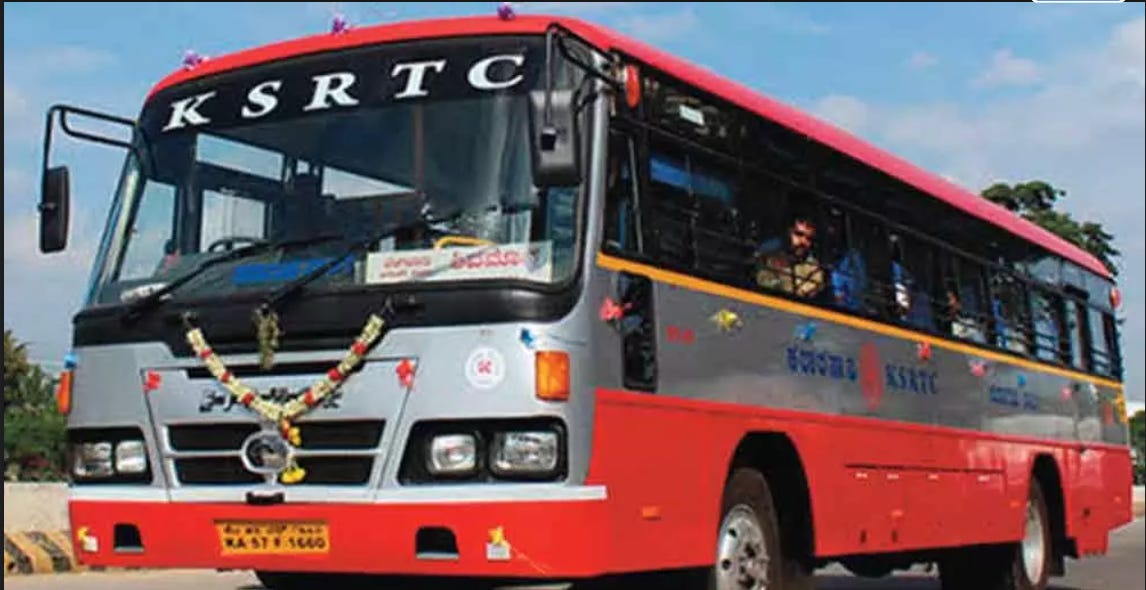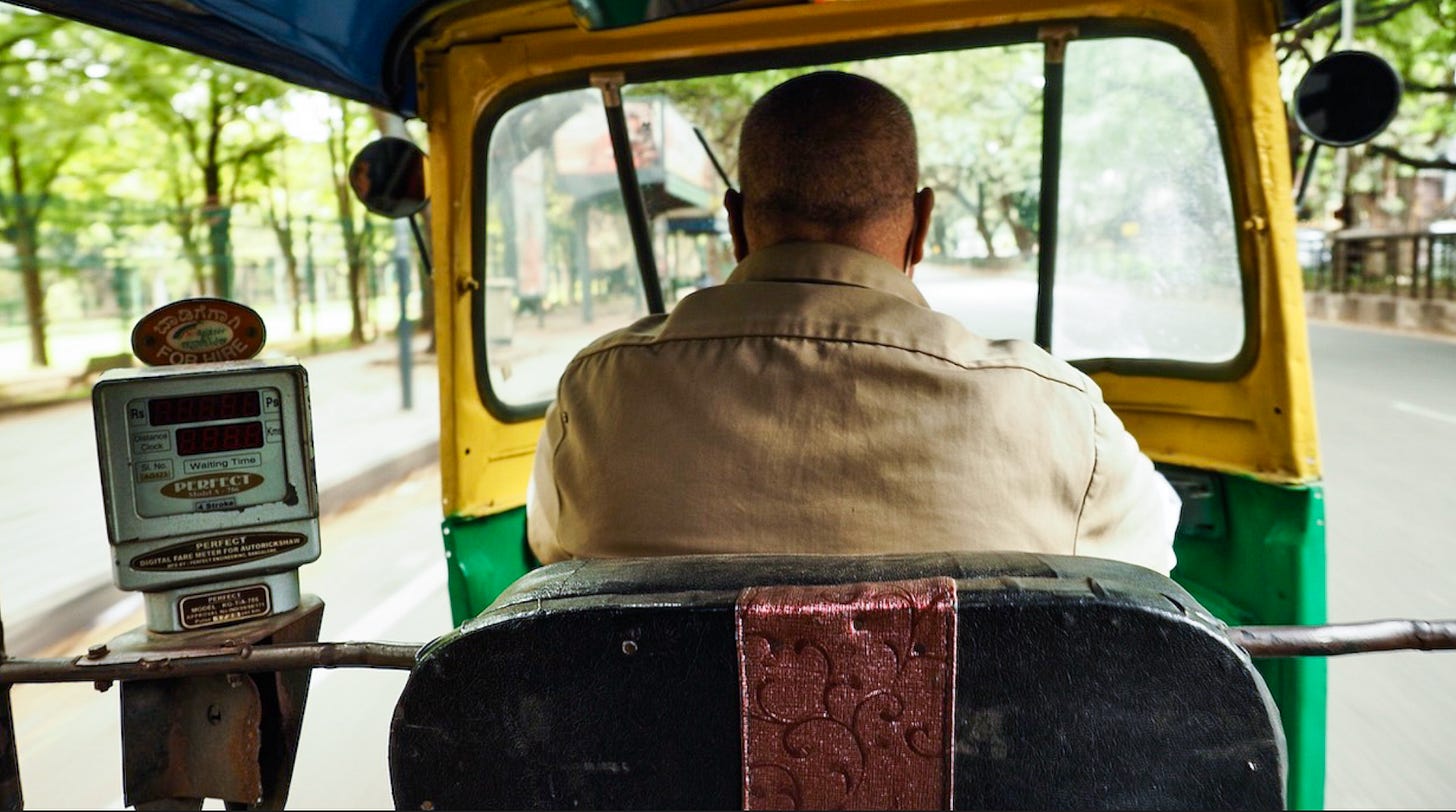Hey friends,
Greetings from Ashoka University, India!
In a recent issue, I wrote about my experience interning in a Tiger Reserve where I mentioned how cruising through the Indian countryside in a local bus was an entire experience altogether. My friend
said that she would be interested in reading what that is like, so this issue is about that!Travelling by a local bus in India merits its own book. It is full of the wonder and charm of ordinary lives which city goers are blissfully unaware of. Sitting in comfortable, air-conditioned cars, we forget that much of India does not travel like that. They must sit on flat, uncomfortable chairs and endure all the bumps felt through the bus' poor suspension. These buses get so crowded that finding a seat is impossible. You must stand, squeezing your body within small gaps between people.
Once, in rural Karnataka, I made the mistake of catching a local bus at 8 am to get to the nearest town. This when most children head to school and so for 2 hours, I stood sandwiched between a dozen school-going kids. Claustrophobia takes on a whole new meaning when you need to stand in such a position with a 10kg rucksack strapped to your back. It was intensely uncomfortable and I hope I will never have to do that again (even though I probably will).
I travel alone wherever I go, especially if I'm travelling to a wild destination. Most of these places are in rural India, and that means spending hours in such buses. On these journeys, I encounter all kinds of people. I've sat with grandfathers who rave about their children's accomplishments, boys who dream about becoming footballers, girls who wish to become nurses and so on. Their realities are so different from mine, and yet some are so similar. We might differ in contexts, but we all strive for a good life. Aren't we all united by the same desires?
Conversations with these people make you realise how different life in the city is. Even a simple act like receiving an Amazon delivery is a luxury denied to those who live on the margins. Most Indians live in rural settings, showing how stark the divide is. But despite not having these luxuries, it doesn't seem like the people are missing out. I hope it stays that way.
I always keep a lookout for the kind of clothes people wear. We in cities have become so westernised in the way we dress. Movies and social media influence the way we present ourselves today. Kurtas, lungis and sarees are getting hard to come by. But in these rural areas, they are the norm. I feel out of place in these buses wearing my Nike t-shirts and jeans. One of these days, I must dress ethnically and travel to see what it is like.
Travelling on buses opens your eyes to sights that, from a car, you'd forever be blind to. These buses have to weave through villages off the highway, picking up people from the remotest of settlements. There have been times when I thought the bus was heading into deep forest, only to learn there was a village several kilometers off the main road.
A word must be said about the delightful joy of rural life. Be that in the great mountains of the Himalayas to the salty towns on coastal ridges; there is a beautiful charm of places that haven't been swarmed by hordes of tourists. It has a simplicity, a calmness, an aura of quietude that leaves an enduring mark on one's heart. Witnessing these places on such bus rides moves me beyond what even the best words can say.
Buses force you to travel light. You can't carry three suitcases on a bus and expect to be well received. It's just not the way things work in India. So even though I need to travel for a week or more, I must fit all my things into one rucksack. This training is a frugal lifestyle is sure to come in use sometime in life.
So when you get the chance, hope on the next bus and see where it takes you. You might find it more illuminating than you initially thought.
This Week’s Links
In keeping with my JK Rowling phase that I am going through, here are some more interviews of the world-famous author. Take your pick; they are all VERY GOOD.
J.K. Rowling 2012 Interview – Harry Potter: Beyond the Page
A Conversation between JK Rowling and Steve Kloves
A Conversation between JK Rowling and Daniel Radcliffe
Postcard
On a related note, this is the view from inside a Auto-rickshaw, which is the local “Indian” taxi that can be found across the country. These open air cabs amass around public squares, waiting to catch passengers to transport at a cheap rate.
On the left, you can see the “electric meter” which is supposed to calculate the price of the ride with the distance covered. But more often than not, the driver’s quote their own price, which you either accept or decline. You can haggle for a cheaper rate, but that’s a whole other skill that I am yet to perfect. My friends are exceptionally good at it. Perhaps I should be more observant of them…
Maybe I should write about what an auto-rickshaw ride entails…
Favourite Quote
“The object isn’t to make art, it’s to be in that wonderful state which makes art inevitable.” — Robert Henri
Have a creative, energetic and inspiring week!
If you’re new, welcome to The Owlet! My name is Ishan Shanavas, and I am an Artist, Photographer, Writer and Student of the Natural World.
Here I talk about my work, along with curating the most interesting ideas on the internet. I confine them to topics like Nature, Culture, Photography, and Art but often fall prey to other genres.
I would greatly appreciate it if you shared my newsletter and work with your friends. It really helps me out :)







Love reading about your adventures, Ishan! It’s also interesting to hear how there’s a growing disparity in how people dress between cities and rural areas.
As I’ve said before, India is still on my bucket list and I hope to someday meet up there. The dream would be to have a WOP reunion and you could take us to see some of your favourite wildlife areas! :)